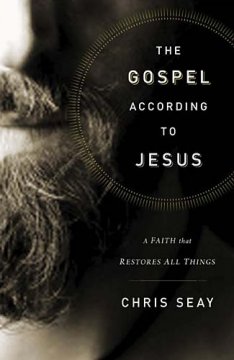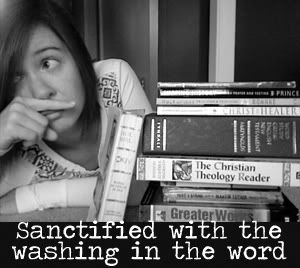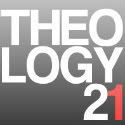Review: The Gospel According to Jesus
Have a blog? Want free books? Check this out.
 I’m really having a hard time reviewing this book. I don’t know what to think of it, and while part of me thinks I need to read it again to be able to write a good review – the other part of me just doesn’t want to.
I’m really having a hard time reviewing this book. I don’t know what to think of it, and while part of me thinks I need to read it again to be able to write a good review – the other part of me just doesn’t want to.
I really wanted to like this book, but I’m not sure if I do. Where do I begin?
It seems that the author, Chris Seay, wrote the book in response to a study that discovered how little most American Christians understood about the basic tenants of their faith. I’m not sure it’s because of a lack of books or teaching on the matter, though.
When I actually finished the book, I had to sit back for a moment and think about what it was about. The title would lead you to believe it’s about the specific message of the gospel of Jesus Christ, but it’s not. It’s kind of a modern Christian primer, with each chapter touching on a different aspect of our faith. There seemed little to tie one chapter to the next, however, or lead the reader along some progressive journey.
As for the actual theology in each chapter, it’s kind of hit-and-miss for me personally. Which, in a way, points to the fact that the chapters don’t really build on each other.
I agree, for example, that the research suggesting American Christians’ ignorance of what we profess to be our faith is alarming. I agree that Jesus needs to be the center of our attention as the Church.
But I don’t think I’ve ever scrawled as much in one chapter of a book as I did through the chapter titled “What Is the Gospel?” Not underlined and starred – countered and question-marked. There seems to be some confusion between the simple message that is the gospel – that you are unworthy and undeserving, but forgiveness has been offered as a free gift of God – with the whole of the message that Jesus preached as the kingdom of God.
I agree that we’re made in the image of God and that has vast implications. I agree that sin is bad. I agree that our primary objective should be to set our hearts on God.
But the very next chapter on justification almost seems to have confused its author. I’m sure Seay understands the difference between “works” that try to earn salvation and “works” that are a result of salvation, but he never comes out and explains it – he just goes back and forth between the two.
On page 130, Seay nails it (finally). He writes,
“If we have to work or give money or circumcise our sons or be charitable to the poor to earn salvation, then the gospel according to Jesus is not present.”
True.
But two pages earlier, he quotes Romans 8:3-4, and writes,
“From this passage it is clear that we are freed with a purpose: to accomplish his restorative justice.”
I don’t see that summary anywhere in Romans 8:3-4.
The last two chapters on shalom are fine, but not really noteworthy. Peppered between the fine chapters, though, are statements and summaries that I have to flat out disagree with, and the whole experience is a little confusing.
In between each chapter is a short “transcript” of a conversation between Seay and one or two other modern, famous Christians. Some of them I like, some I disagree with, some I don’t know. He writes, before the first one, that he wants the reader to “experience a taste of our table talk and eavesdrop on the insight …”
I love a good conversation, and totally agree with his heart in these sections. You can learn a lot more, usually, in a good conversation than you can in a sermon. Reading a good conversation, though, is just like reading a book. I probably would have skipped these sections if I hadn’t agreed to read the whole book.
Finally, I have to point out that all of the scripture is taken from The Voice translation, which bothers me for two reasons.
(1) It’s similar to The Message in that it aims to give a “holistic” and “balanced” translation that modern readers can relate to (read: easily understand), as opposed to simply translating scripture as accurately as possible. (If you haven’t heard of The Voice you can learn more here.) The Message and The Voice are both wonderful projects that serve the word of God well, but may not be the best choice for a theological study.
(2) The Voice translation is Chris Seay’s project, which – from an academic standpoint – doesn’t make it the most credible translation to use when you’re proposing to teach scripture.
Summary? It’s a Christian primer for people who have been Christians for a while, and maybe need to be re-primed. So much of it is potentially confusing, and presumptively incorrect that I’d beg you not to give it to someone who isn’t actively attending and involved in a good, Bible-teaching church.
If you pushed me into a corner about whether or not I like it, I’d have to say No.










